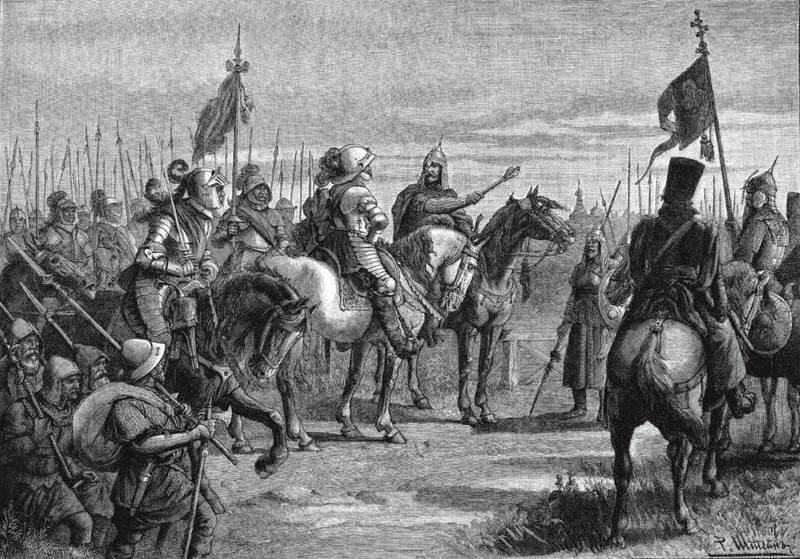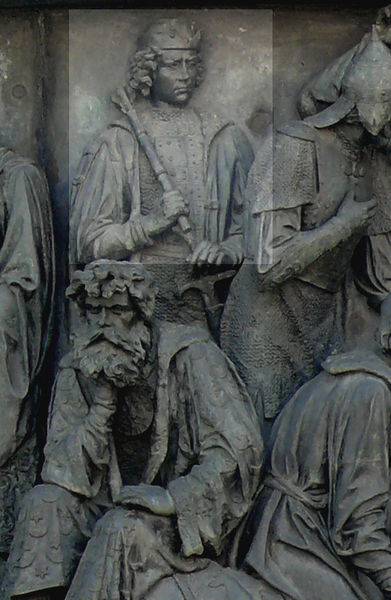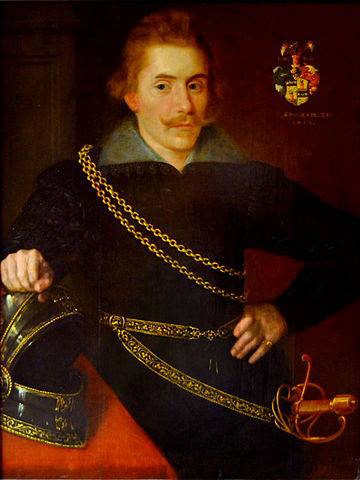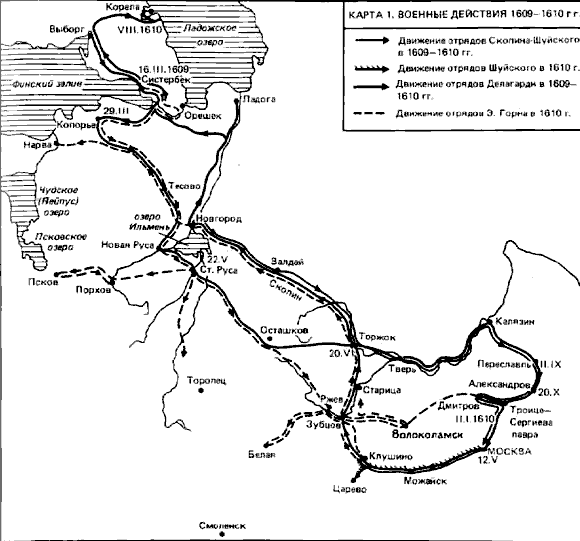Skopin-Shuisky campaign: battles near Torzhok, Tver and Kalyazin
Caught in a hopeless situation, Tsar Vasily Shuisky decided to make a bet on the outskirts and foreign aid. Sheremetev received an order to unlock Moscow to recruit troops in the Volga region from the Tatars, Bashkirs and legs. Moscow turned for help to the Crimean Khan. Shuisky also decided to ask for help from Sweden, which was then in a state of prolonged conflict with the Polish-Lithuanian Commonwealth (both great powers claimed vast lands in the Baltic States). In the summer of 1608, a talented warlord Tsar's nephew, Prince Mikhail Skopin-Shuisky, was sent to Novgorod. He was instructed to gather in the Russian North to help the besieged Moscow troops, including inviting Swedish mercenaries to the Russian service. Having established ties with the Zemstvo authorities from Perm to the Solovetsky Monastery, Skopin managed to gather up to 5 thousands of Russian soldiers from noblemen, townspeople and peasants. A detachment of free Cossacks Dmitry Sharov, who had previously fought in the army of Bolotnikov, arrived at his service.
At the same time, the king's nephew negotiated with Sweden for military assistance, which King Charles IX offered three years ago. Sweden has long been looking for a reason to interfere in the internal affairs of the Russian state. Therefore, the Swedish leadership gladly used the opportunity. 28 February 1609 was signed by the All-Union Vyborg Treaty, according to which Tsar Vasily Shuisky, in exchange for hired soldiers, gave the city of Korela to Sweden with the county. Thus, foreign military aid was purchased at a high price. In addition, the alliance with Sweden concealed a great danger in the future. Firstly, the Swedes were on their minds and wanted to use the problems of the Russian state to expand their possessions at the expense of the Russian North and the Baltic states. Secondly, the military alliance between Shuisky and Charles IX led to a sharp deterioration in relations with Poland, which was only looking for a pretext to begin open intervention. Polish-Lithuanian Commonwealth received a reason for open invasion.
Tsar Vasili counted on the help of the Swedish army well trained and battle-hardened. However, King Charles IX, not wanting to throw his regiments into the fire, sent a detachment of mercenaries to 7 thousands of people (Germans, Swedes, French, British, Scots and others) under the command of Frenchman Jacob Delagardi (Earl of Jacob Pontus de la Gardi). Swedish recruiters quickly recruited mercenaries in a constantly fighting Europe, loaded ships and quickly shipped to Russia, translating to the maintenance of the Moscow tsar. The first squads arrived on Russian territory in early March, and in Novgorod - on April 14 of the year 1609. Soon, the number of auxiliary Swedish corps was brought to 15 thousand fighters. The cost of maintaining the mercenary troops fell on the shoulders of the Moscow government. The cavalrymen were supposed to pay 25 thalers (efimkov), infantrymen - 12 thalers, "big voivods" - 5000 thalers, voivods - 4000 thalers. The mercenaries immediately demanded a salary, and the Russian voivode frantically corresponded with the king and the cities in order to collect at least some money.

Skopin-Shuisky meets the Swedish governor Delagardi near Novgorod
Skopin-Shuisky offensive
Delagardi planned to start a “war of sieges” - taking the outskirts of Pskov, Ivangorod, Yam, Koporye, etc., to the swearing-up Dmitry, in turn. Such a war was beneficial to the mercenaries and the Swedes: it made it possible to plunder, which they always did in European wars, their service would be delayed for a long time, which led to an increase in payments. But problems with the maintenance of the army would give the Swedes the opportunity to present Moscow with new territorial claims. Skopin was not satisfied with such a war, he demanded a campaign against Moscow, in a decisive battle to smash the Tushino thief himself and his hetmans. Victory in the battle immediately destroyed the entire "Tushino Russia" - with the imperial king, the Boyar Duma, the patriarchy, deprived the base of Polish troops, scattered around the Russian kingdom.
In May 1609, the Skopin-Shuisky militia, together with the mercenary army, launched an offensive, marching from Novgorod to Moscow. In early May, the Russian-Swedish 3-4 thousand avant-garde, led by Fyodor Chulkov and Evert Gorn, marched from Novgorod to clear the road to Torzhok for the main army. Under their onslaught, a detachment of Polish hussars of Kernozitsky left Old Russa without a fight, which the allies occupied on May 10. After that, the Poles tried to make a sudden raid, but were repulsed. In his time, Delagardi served in the Netherlands with Moritz of Orange and trained his soldiers in his innovations. Polish hussars stumbled upon the German infantry, bristling with spears, and the musketeers from behind the cover struck the enemy with fire. Then the Russian and Germans overturned the Poles with a counterattack, and Chulkov’s noble cavalry completed the defeat. At the same time, the regiment under the command of Nikita Vysheslavtsev, with the support of the local population, beat off Yaroslavl. The Russian-Swedish squad continued the attack and approached Toropets.
May 15 held the Battle of Toropets. The Russian-Swedish squad caught the Poles and Cossacks of Kernozitsky by surprise (about 6 thousand people). At the first blow of Gorna's armored infantry, the army of Kernozitsky fled, and the noble cavalry of Fyodor Chulkov completed the rout of the enemy. With the remnants of the detachment Kernositsky tried to gain a foothold behind the walls of the nearby Trinity Nebina monastery, but was attacked and knocked out of it. The Tushyntsi, having abandoned artillery, fled from Toropts, who immediately “rebelled” from the “Tushinsky thief”.
Thus, the advanced forces of the impostor in the north were crushed. After the capture of the Russian-Swedish detachment Toroptsa began a chain reaction. Torzhok, Staritsa, Ostashkov, Rzhev, Zubtsov, Kholm, Nevel and other northwestern Russian cities were “deposited” from False Dmitry II. The North was liberated from the Tushians, and the army of Skopin-Shuisky and Delagardi covered their right strategic flank.

Mikhail Skopin-Shuisky at the Monument "1000 Anniversary of Russia" in Veliky Novgorod

Swedish military and statesman Jacob Pontusson Delagardi
Fighting near Moscow. Getman Rozhinsky 5 June 1609 was again tried to seize Moscow. His cavalry crossed the river. Khodynka and attacked Moscow. But the Russian cavalry rang out to the sides, and the “Pole-town” walked in front of the Poles with cannons that struck with accurate fire. And when the enemy regrouped and abandoned the infantry to storm the fortifications, Russian cavalry piled up from the flanks. Tushintsy was overturned, pursued and driven into Khodinka, killing more than 400 people. From the final defeat of Rozhinsky was saved by ataman Zarutsky, who, with several hundred Cossacks, took a comfortable position on the Khimka River and stopped the Moscow cavalry with a counterattack. 25 June was followed by another assault, and again with no success. The Russians seized several guns, and some of the retreating enemies were cut off and pressed against the Moscow River, many were drowned.
Battle of Torzhok (June 17). After Chulkov and Gorna’s vanguard defeated an enemy detachment in the Battle of Toropets, the Russian-Swedish army marched from Novgorod and moved to Torzhok. The strategically important city itself was already “laid aside” from the impostor, and the fortress was occupied by the vanguard detachments of Kornily Cheglokov, Klaus Boy and Otto Helmer, so the warriors Semen Golovin and Evert Gorn joined them (about 5 thousand people).
At the same time, the Tushinois were pushing forces to Torzhok in order to stop the advance of the army of Skopin. 13-thousand army Tushinites consisted of 8-thousandth squad Kernozitskogo (2 thousand Polish hussars and 6 thousand Cossacks and Tushinites), 2 thousand. Polish lancers Pan Zborowski, 1 thousand. Cavalry detachment under the command of Tushino magistrates Gregory Shakhovsky and 2 thousand soldiers from other Polish regiments. However, at the time of the battle near Torzhok, the Tushians managed to concentrate less than half of their troops.
Alexander Zborovsky, who led the troops of the interventionists, tried to immediately take the city, but could not do it. The garrison repelled the attack. The attackers set fire to the Kremlin, but managed to put out the walls. Meanwhile, a detachment of Golovin and Horn approached the garrison. After that, the troops lined up against each other in battle formations. Zborovsky began the battle of a massive heavy armor-mounted cavalry. Part of the Polish cavalry ran into a deep phalanx of German mercenaries, bristling with long spears, and was forced to retreat, suffering heavy losses. However, part of the attacking Poles managed to crush the Russian and Swedish cavalry on the flank, and drove her to the city walls. But the successful sortie from the city of the Cheglokov squad restored the situation. Russian-Swedish cavalry, together with reinforcements, launched a counterattack. Tushyntsy were forced to retreat. In addition, Zborowski learned from the prisoners about the approach of a large army of Skopin and Delagardi and chose to withdraw to Tver in order to gather all the available forces to repel the enemy.
Thus, tushintsy suffered a serious defeat. Zborovsky could not take Torzhok and stop the movement of Skopin’s army. Poles suffered serious losses. It became obvious that a well-organized and armed Skopin-Shuisky and Delagardi army was able to withstand the heavy Polish cavalry in a field battle. In the Tushino camp they became worried and large reinforcements were sent to help Zborovsky near Tver. After the victory near Torzhok, detachments of servicemen from Smolensk, Vyazma, Toropts, Belaya and other western cities joined Skopin. So, Prince Yakov Baryatinsky, sent by voivod Michael Shein, came from Smolensk with 4 thousand warriors, on the way he freed Dorogobuzh, Vyazma and Belaya from Tushino.
Tver battle
The Russian commander Skopin-Shuisky insisted on a speedy continuation of the offensive, until the enemy received reinforcements. The following regiments were formed in Torzhok: the Watchdog Regiment under the command of J. Baryatinsky, the Forward Regiment S. Golovin and the Big Regiment of Skopin-Shuysky and Delagardi. The Russian-Swedish army numbered about 18 thousand people. Poles and Tushins were about 9 thousand people, the basis of the troops were 5 thousand horse Zborovsky detachment.
7-8 July, the Russian-Swedish army came from Torzhok, and July 11 approached Tver and camped 10 versts from it. Tushino army took up a fortified position. Skopin tried to lure the enemy to an open place with small cavalry units, but without success. Then on July 11 he launched an offensive: in the center stood the Swedish and German infantry, on the left flank - the French and German cavalry, and on the right - Russian. It was planned to divert the enemy with blows from the left flank, then with a powerful blow from the right flank to cut him off from the city, press him to the Volga and destroy him.
In the pouring rain, the army of Skopin attacked the Polish army of Pan Zborowski on the outskirts of Tver. However, the Russians and the mercenaries acted separately and could not organize a single blow. The Poles managed to strike ahead and knocked over the horseback of the Delagardi. The French and German cavalry turned to stampede, suffering heavy losses. Mercenaries, having decided that this defeat rushed into the camp, to rob property. The Swedes defended their good, the commotion began. But infantry in the center, despite heavy rain, which prevented the use of firearms weapon, repelled the enemy attack. Withstood the Polish attack and the Russian cavalry. By 19, the battle was over and the Tushians returned for fortifications. Skopin's troops moved over the Volga. Thus, the Tushians, despite their initial success, could not achieve a radical change in the battle.
In the camp, the Tushins already celebrated their victory, believing that they had repelled the offensive of the enemy army, but they rejoiced early. The young voivod Shuisky, who had skillfully regrouped his forces, struck 13 July under cover of night with a sudden blow to the enemy. Russians and Swedes broke into the enemy camp. After fierce logging, the Poles flinch and fled. The Allied army captured the Tushinsky camp and big booty: “They beat the Polish and Lithuanian people, and they took the camps, and besieged Tver. And near Tver, Russian and German people made a lot of wealth from the Polish people. ”(“ The Tale of the Victories of the Moscow Kingdom ”). The Polish army suffered heavy losses, Pan Zborowski (he was badly wounded in the battle) and his remnants fled to the Tushinsky camp, pursued by Skopin-Shuysky's light cavalry.
However, after this decisive victory, difficulties began. Skopin led a part of the army to Moscow. Delagardi himself did not burn with the desire to continue the march on Moscow, but preferred to limit himself to the defense of the Novgorod land. The Polish garrison of Mr. Krasovsky and Delagardi's mercenaries remained at the fortress in Tver. Delagardi made several attempts to assault Tver, but without success. The mercenaries suffered heavy losses in the battle of Tver and during the assault, rebelled, demanding a salary, and, without receiving any money, turned back. The deserters moved first to Torzhok, and then to Valdai. On the way, marauders robbed the local population, raped women and girls. Only a small part of the Swedish troops headed by Delagardi remained (just over 1 thousand fighters). Skopin-Shuisky, with only a few thousand Russian warriors, was forced to abandon the attack on Moscow and begin to form a new army.
Battle of Kalyazin
Abandoned by the mercenaries, the voivode Skopin-Shuisky did not take the direct route occupied by the Tushins to Moscow, but turned to Kalyazin. Having crossed the Volga, the Skopin-Shuisky army approached Kalyazin. Here, at the Trinity Makaryev Monastery, over the next two months, a new army was formed, which was reinforced by militias from Yaroslavl, Kostroma, Uglich, Kashin and other cities. Skopin-Shuisky sent messengers to all the neighboring cities, calling to send him additional troops, as well as money. As a result, by August, according to various sources, the Skopin army increased to 11-20 thousand people.
Of the Delagardi army, initially only the Swedes under the leadership of Christer Somme remained with Shuisky (about 1 thousand soldiers). The majority of the army consisted of peasants, Skopin-Shuisky attracted Somme to guide the military training of the militia in the Dutch style and later wrote to Delagardi that without Somme he could hardly have trained many untrained people who had flown to him from Yaroslavl, Kostroma and Pomorye every day. Militiamen were taught the tactics of Orange: formation, alignment of units, combination of defense with long spears and rifle fire. After all, the Russian warriors, like the Dutch, needed to withstand the blows of knightly cavalry and heavy armored infantry. Kalyazin actually became for a short time the military-political center of the Russian kingdom.
Meanwhile, the Polish hetman Jan Sapega, who during this period continued to besiege the Trinity-Sergius Monastery, decided to eliminate the growing threat from the army of Skopin-Shuisky and the first to attack the enemy. 12-thousandth detachment of Jan Sapega left the siege of the Trinity-Sergius Lavra (part of the troops remained to block the monastery) and went to join Zborovsky, speaking from Tushin with Zaporizhia and Don Cossacks. The number of the combined troops was not inferior to that which Skopin-Shuisky had assembled. Among the Poles, the main part of the army was cavalry, and in Skopin, infantry.
28 August 1609 near the Trinity Makaryev monastery, the Kalyazin battle began. The Russian cavalry, with a mock retreat, lured the vanguard of the enemy to a swampy part of the bank of the Zhabni River. After that, the Russian cavalry from two sides attacked the enemy. Tushinskis could not turn around, were disorganized and suffered great losses. The remnants of the squad ran to their. And the Russian troops left behind Zhabnya in a fortified camp near the crossing of the Volga.
The main forces of the Tushins, furious with the defeat of the vanguard, attacked the Russian camp. Skopin-Shuisky was able to compensate for the shortage of cavalry troops by previously prepared fortifications and properly chosen defensive tactics. The attack of the Polish and Cossack troops was stopped by Russian field fortifications, where the enemy cavalry fell under heavy food fire. Then the Poles began to make demonstrations, rolling and pretending to get away to lure the Russians because of the fortifications. But they did not peck and did not leave the shelters. Then the Polish command again changed tactics. However, an attempt to break into the Skopin-Shuisky camp as a result of an unexpected strike from the side of the Zhabni River was foreseen by Skopina-Shuisky. Russian troops met the attackers and as a result of the seven-hour battle they won up. When tushintsy were tired and bloodless fruitless attacks, Skopin launched a counter-offensive. The tired Tushins began to retreat behind Zhabnya. Inspired by the warriors of Shuisky, they increased their pressure, Sapieha’s troops reached the wagons and continued to push them further. Tushyntsy could not stand it and ran on the way to Uglich. They were chased throughout the 15 version. Broken regiments of Sapieha returned to the Trinity-Sergius Monastery.

Thus, the Russian army, prepared and organized by Skopin-Shuisky on the Western model, independently won a brilliant victory over the Tushins (professional Polish and Cossack cavalry) without the help of the Swedes and foreign mercenaries. The rumor about the victory spread widely across Russia. Skopin received great prestige among the people.
But before the victory was still far away. A Crimean horde led by Tsarevich Janibek appeared on the southern frontiers. Tsar Vasily Shuisky also turned to Khan for help, and informed that the Crimean Tatars were going as allies. However, the Crimean Tatars did not intend to fight the professional cavalry of the Poles and the “thieves” Cossacks, but pogroms Tarusa, destroyed the environs of Serpukhov, Kolomna, Borovsk - and left, stealing full. And the people cursed Shuisky for such "allies."
The Russian army remained at Kalyazin for about a month, continuing to build up its forces and sending troops to liberate individual cities and to support the Trinity-Sergius Monastery. With the funds sent by the monasteries and merchants, Skopin-Shuisky again attracted the mercenaries of Delagardi to his army, not wanting to leave them without control in their rear. In the fall, the Russian army moved east and took Pereslavl-Zalessky, after which they also managed to take the Alexander settlement. Thus, the armies of Shuisky and Sapieha became close again.
To be continued ...
Information